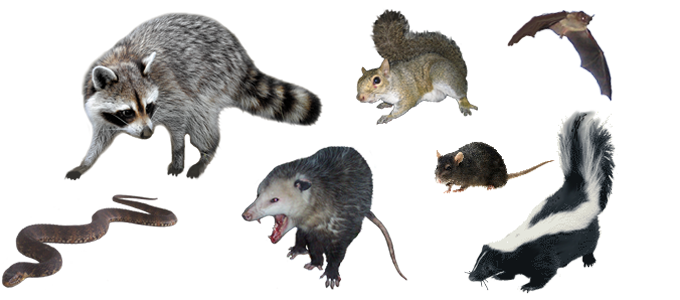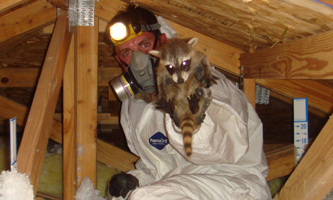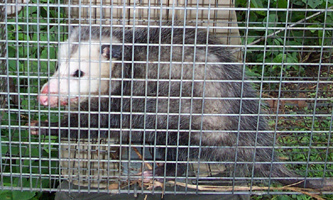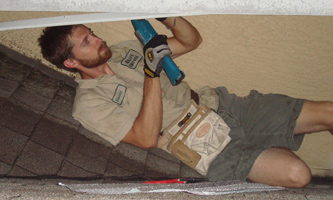Delaware Wildlife Control Services
We Provide a Full Range of Delaware Wildlife Removal Services
What problems do wildlife cause?
Most of the calls we get are because homeowners hear animals scurrying around inside the attic or walls. Most of the damage inside a houes or attic is unseen. Rodents like squirrels, mice, and rats often chew on electrical wires.
Wildlife such as raccoons, bats, birds, opossums, and rats spread several diseases that humans can and do catch, such as Histoplasmosis, Salmonella, Leptospirosis and more. Many critters leave droppings and urine in an attic or cause mold or odor problems.
We also handle animals outside the house. It could be a critter that has dug a large hole next to your house, or a raccoon in your garbage cans, an opossum that is stealing pet food, or a skunk living under your deck, causing an odor problem. Some animals destroy your garden or landscaping. Or perhaps you are simply scared of snakes. Whatever
the problem is, our wildlife experts can remove the source of the problem, and prevent it from happening again. We are not a Delaware extermination company, nor pest control. We are dedicated Delaware wildlife control experts.
Delaware Raccoon Removal - Raccoons commonly live in the attic, where they cause damage. They can also cause many problems outside.
Delaware Rat Extermination - We solve rat and mouse problems PERMANENTLY, by finding and sealing shut any and all rat entry holes.
Delaware Bat Control - We have a 100% success rate safely removing Delaware bats from buildings, and we guarantee our work.
Delaware Squirrel and Rodent Removal - For any critter, such as squirrels in the attic, we remove them, repair damage, & clean.
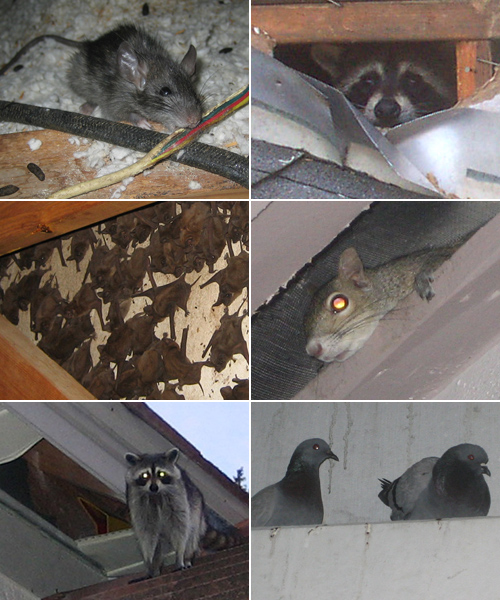
Why is our company the best?
We believe we are Delaware's best. We do a complete job, from start to finish. We remove wildlife humanely and effectively. When we encounter animals inside a house, we inspect every part of the house, from ground to roof, to identify all the areas of entry, and we perform professional repairs, with guarantee. We inspect inside the attic to find any damage, and provide full cleaning services. We offer attic restoration, permanent rodent control, bat colony exclusion, bird prevention, snake removal, dead animal removal and odor control, and more. We are fully Delaware licensed and insured, and ready to solve your Delaware critter problem. Call us any time for a phone consulation and price quote, at 302-394-6930.
Delaware wildlife removal - article of the month
Mole trapping
Moles are popular because of their burrowing nature and in most cases they are considered as
pests because they construct tunnels under the ground that disrupt growth of plants. There are
several ways that you can use in order to get rid of the moles but the most effective way of capturing
them is via Delaware bird control trapping them. Other traditional methods are likely to work but in most situations they are
very ineffective. There are also scientific methods built most of them have proven to be very dangerous
to both humans and other animals.
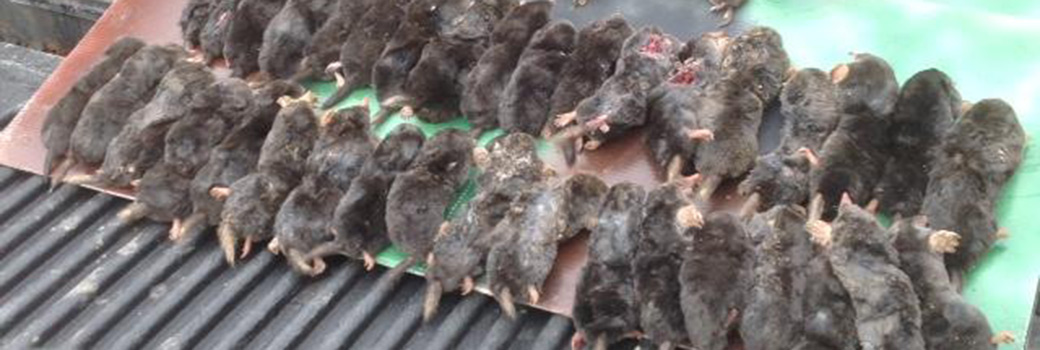
The use of traps is therefore one of the techniques that is highly dependable and in order to come up with
the perfect ways, you have to understand the behavior and the biology of the moles. They are usually active
all year round and this is advantageous because you can capture them at any time regardless of the season.
You can also easily trap them only if you can identify areas that have abundant food supply. Since they mainly
feed on worms, you have to spot an area within the lawn whose soil is loose and has a lot of moisture; this can
therefore be your starting point. Moles will always change the tunnels that they use to get to the food therefore
you have to be fast and extra careful especially when you decide to capture them.
Why trapping is more effective
Using traps to capture the moles is very effective because at the end of the day, you are always sure of the end
results. Moreover, the moles usually dig two types of tunnels; networks of tunnels that act as their feeding zones
and deep tunnels that are occasionally used. The surface tunnels will always be left open because they are feeding
zones it very easy to capture using traps. The snout of the moles is very sensitive especially if it comes across
any strange object therefore you have to use traps that are not easy to detect once they come across them.
Types of mole traps
• Humane made trap
The humane made trap is easy to make because all you have to do is to assemble materials from your home that will be
very effective to carry out the procedure. When they are all ready, you have to move to the next task; capturing the mole.
• How to set up the traps
First, you have to identify the tunnels and the mounds that are usually visible on the ground. When this is done,
you have to collapse the soil that surrounds the tunnel so that you can determine how deep it goes. If the tunnel
is deeper, you have to dig into it and remove the soil so that you can leave a clear path for the moles.
You will then place the Delaware rodent extermination trap in a lengthwise manner and facing into the tunnel. This will allow the mole to crawl
into the trap unknowingly. You will therefore leave the trap overnight and check on it the following day; if the trap
is set perfectly well them the mole will be captured. You have to use a number of traps because there are likely to be
more than one mole.
• Harpoon trap
This type of trap is relevant especially when the tunnel is hollow, after which you have to gently push it into the ground
and ensure that it lies flat in the middle of the tunnel. When you are done with the setting process, you have to pull the
setting tee in order to set the Delaware bat removal trap. This type of trap is very effective because it uses the shortest time possible to capture
the moles.
• Homemade trap
This kind of Delaware rat control trap requires a bucket and a board, the board acts as the support while the bucket captures the mole. When you
identify the tunnel, you position the bucket and the board in such a way that there is a small opening left. It works because
once the mole is trapped in the bucket, the board will seal the opening and you will be able to handle the mole yourself.
Observation
When all the traps have been set, you have to keep monitoring the tunnels and make sure that the Delaware snake removal traps are still intact. If the
mole is not captured within two days you have to remove the trap because chances are that the mole has relocated and is using a
different channel. You will have to repeat the procedure by identifying fresh tunnels, setting the traps and wait for the moles
to be captured. If you are lucky enough to capture the moles, try hard not to kill them because it is not always a permanent solution.
You can decide to transport them to locations that are further away from the lawn, you can release them into the wilderness or you can
simply take them to the Delaware raccoon removal wildlife control professionals.
Other Delaware animal pest control topics:
How to Kill a Rat
Info About Pigeons
Best Repellent Against Moles
Where to Relocate a Trapped Opossum
Female raccoons that are nesting will look for ways
to enter your home. They usually will look for ways into
your attic, garage, or shed. In some cases, simple traps
will catch them, but in other cases, the mother will create
the nest out of reach or view. Our team specializes in trapping
and removing raccoons as well as other Delaware wildlife!
We service the following cities and counties:
Delaware City, Harrington, Lewes,
Milford, New Castle, Rehoboth Beach,
Seaford,
Wilmington,
Dover,
Middletown,
Newark,
New Castle County, Kent County, and
Sussex County.
We are ready to solve your Delaware wildlife removal issue!
Call 24/7 to discuss your wildlife problem and get a price quote.
Call us any time at 302-394-6930 - We look forward to solving your wildlife problem!


